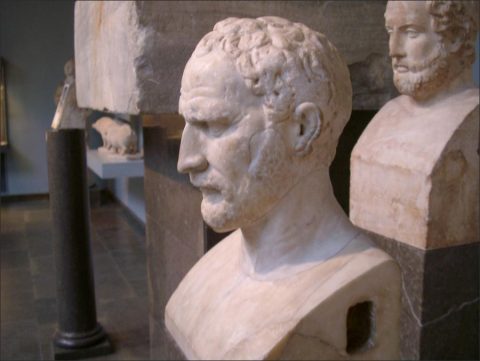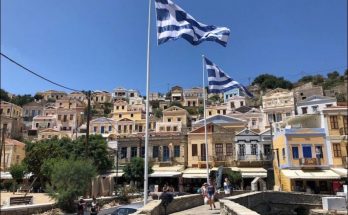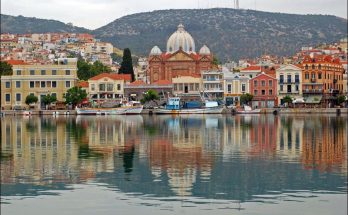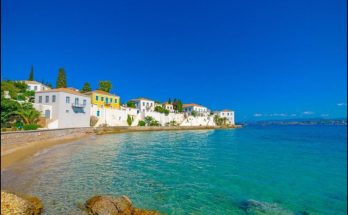Demosthenes was born at Athens in 384 B.C. His father, a rich manufacturer, died when Demosthenes was seven years old. The boy’s guardians embezzled much of the estate, and at the age of twenty-one he went to law with them, succeeding after much litigation but regaining little of his property. He began to address the National Assembly, but failed at first owing to nervousness and defects of utterance.
Quaint stories are told of the methods by which he overcame these faults. In order to win confidence for facing the turbulent assembly, he would stand on the beach during a storm, declaiming a line of the Odyssey full of craggy consonants. To keep himself close to his studies he would shave in such a ridiculous fashion that he dared not leave his room. The indistinctness of his speech he cured by declaiming with pebbles in his mouth. Devices less surprising to us are his habit of drinking water only, in order to keep awake, and of working all night; this latter habit provoked the famous gibe, ‘Your speeches smell of the lamp.’ It is said that he copied out. Thucydides eight times; certainly he was impregnated with the historian’s subject-matter.
He succeeded first as a logographos, writing speeches for others to use in the courts. While so engaged he began important work in his own person, delivering in 355 or 354 the celebrated oration against Leptines. In 351 began his famous struggle against the aggression of the Macedonian king, Philip, a struggle ended only by the complete overthrow of Athens at Chaeronea in 338. To this period belong his most admired speeches, the Philippics, the Olynthiacs, the False Embassy, and (in a sense) the De Corona or ‘Speech on the Crown’, universally regarded as the greatest oration of all time. In 336 Philip was assassinated, and Athens and Thebes rose to secure their independence. But Philip’s son, Alexander, began his earth-shaking career by crushing the revolt with promptness and severity.
Thebes was destroyed, and Athens was compelled to deliver up her ten leading statesmen, including Demosthenes; but their lives were spared. During the quiet years that now followed for Athens, a certain Ctesiphon, who had proposed that a gold crown be voted to Demosthenes, was indicted for this–on a technical point–by Aeschines, Demosthenes’ inveterate enemy. The case developed from the ostensible charge into a great retrospective duel. Demosthenes gives a long and magnificent defence of his whole career and a searching examination into Aeschines’ antecedents, life, and public acts.
He triumphed so completely that Aeschines went into exile; he taught rhetoric, and the story goes that he once read to his pupils the speech of Demosthenes on the Crown, which excited much applause, whereupon Aeschines remarked: ‘You ought to have heard the beast himself.’ In 324 Demosthenes, with others, was accused of ‘appropriating half of an immense sum which had been taken from Harpalus, the absconding treasurer of Alexander, and deposited on the Acropolis. He was found guilty and imprisoned, but escaped to Troezen. Next year Alexander died, Athens again revolted, and Demosthenes returned home. But the rising was quelled by Antipater, and the orator escaped arrest only by swallowing poison ( 322 B. C.).
What’ are the factors in his gigantic reputation? First, of course, his own genius. Second, the fact that he lived in a period not only important but spectacular; the sensational rise of Macedon was to him, what the death-struggle of the Republic was to Cicero, the glories of Le Roi Soleil to Bossuet, the French and American revolutions to Burke. Third, the fact that oratory in Greece had already been developed into a vigorous and supple instrument. Fourth, his magnificent moral earnestness.
If we say that he maintained ‘a high moral tone’ in politics, and held up ‘the highest ideals’ before his countrymen, we may cause a simile or shiver of disgust. But generations of hypocrites who have learnt many phrases from Demosthenes do not prove him an impostor; and the historic facts of his career make it fairly certain that the aims which he urged upon Athens were really dear to him. Further, it is doubtful whether it was even possible to speak as he did without sincerity: a hypocrite would have spoken as nobly, perhaps, but not with the same kind of nobility. There are some symptoms of honesty which cannot be manufactured. One might as well say that Shakespeare did not love music, or Goethe knowledge, as that Demosthenes did not love nobility in politics.
The immense will-power which marked his life has definitely inspired his orations. Everlastingly he urges the Athenians to exert their will: ‘if only you will consent to do your duty.’ These. great harangues are no more remarkable for abuse and exposure of Philip than for instruction of Athens in public morals and sound politics: his Philippics are not ‘philippics’. More than once, detesting the Macedonian as he does, he yet delivers reluctant but magnificent eulogy of his one great merit–will-power.’ Philip, our adversary, in quest of sovereignty and dominion had had his eye knocked out, his collar-one broken, his hand and leg injured, and was prepared to sacrifice whatever part of his body Fortune chose to take, if only with the rest of his person he might live in honour and glory’. It is this combination of noble admonition with professional art and practical statesmanship which gives his works their permanent value.
‘It is impossible, men of Athens, impossible to found lasting power on injustice, perjury, and lies. Such enterprises endure for their first brief hour, aye, and put forth gorgeous blossoms of hope, belike, but Time detects the cheat; their petals shrivel and fall. Just as a house, a ship, or any such matter must have its greatest strength in the foundations, so (it seems to me) must the beginnings and principles of conduct be sincere and just’.
One leading excellence of Demosthenes cannot be shown in brief extracts–his variety of manner, ‘Long and brilliantly detailed sentences are followed by curt blasting phrases or questions of contempt, anger, denunciation; scraps of supposed conversation succeed eloquent and solemn appeals; his emotion rises till the page is starred with metaphors. Even humour is seen in some of the private orations, the subject of which allows him to give brilliant pictures of everyday Athenian life–the ostentation of Meidias’ huge house at Eleusis, and the young Mohawks whose brutal pranks made Conon’s life a burden. It must suffice to give some conception of his most famous passage, describing the panic which filled Athens when news came that Philip was threatening the city itself.
‘Evening fell, and there came one with tidings for the Presiding Committee that Elateia was in Philip’s hands. They were in the midst of dinner, and instantly rising from the table some of them removed the occupants of the booths in the market-place and set fire to the wicker-work, while others sent for the military staff and summoned the trumpeter; tumult filled the city.
Next day at sunrise the Committee summoned the Council to their chamber, you made your way to the Assembly, and before the Council could do their business and prepare the agenda all the people were ready seated. Thereupon, after the Council had entered and the Committee had announced the news brought to them and introduced the messenger and he had spoken, the crier asked ” Who wishes to speak?” And there stepped forward–no one.
Again and again that question was asked, nevertheless no man rose, though all the generals were present and all the statesmen, though our country called through the public voice for the man who should speak and save her… Yet had it behoved those who desired her safety to step forward, all of you and every man of Athens would have risen and walked to the platform, for you all, I know, desired her safety; had it behoved the richest, the Three Hundred would have risen; had it behoved those endowed with both patriotism and wealth, those would have come forward who had performed costly special services, for they did this through patriotism and riches.
But that hour of crisis called apparently for a man not only patriotic and wealthy, but one who had followed the march of affairs from the outset, who had accurately gauged the purpose and the desire guiding Philip’s actions; for no man, however patriotic, however wealthy, who did not know these and had not watched them from afar with careful scrutiny, could know what should be done or give you counsel. There appeared on that day such a man. It was I.’ Demosthenes has been compelled by the attack of Aeschines to offer his splendid self-justification; and no passage ever written shows better the real secret of political greatness–to meet a testing situation where routine fails.
Visits: 262



